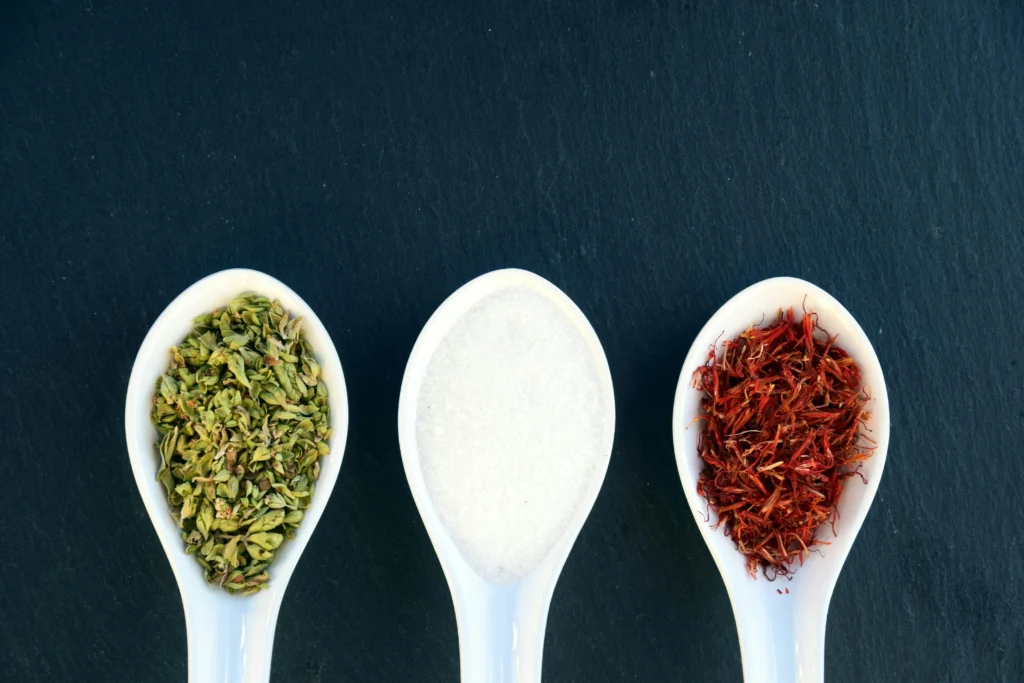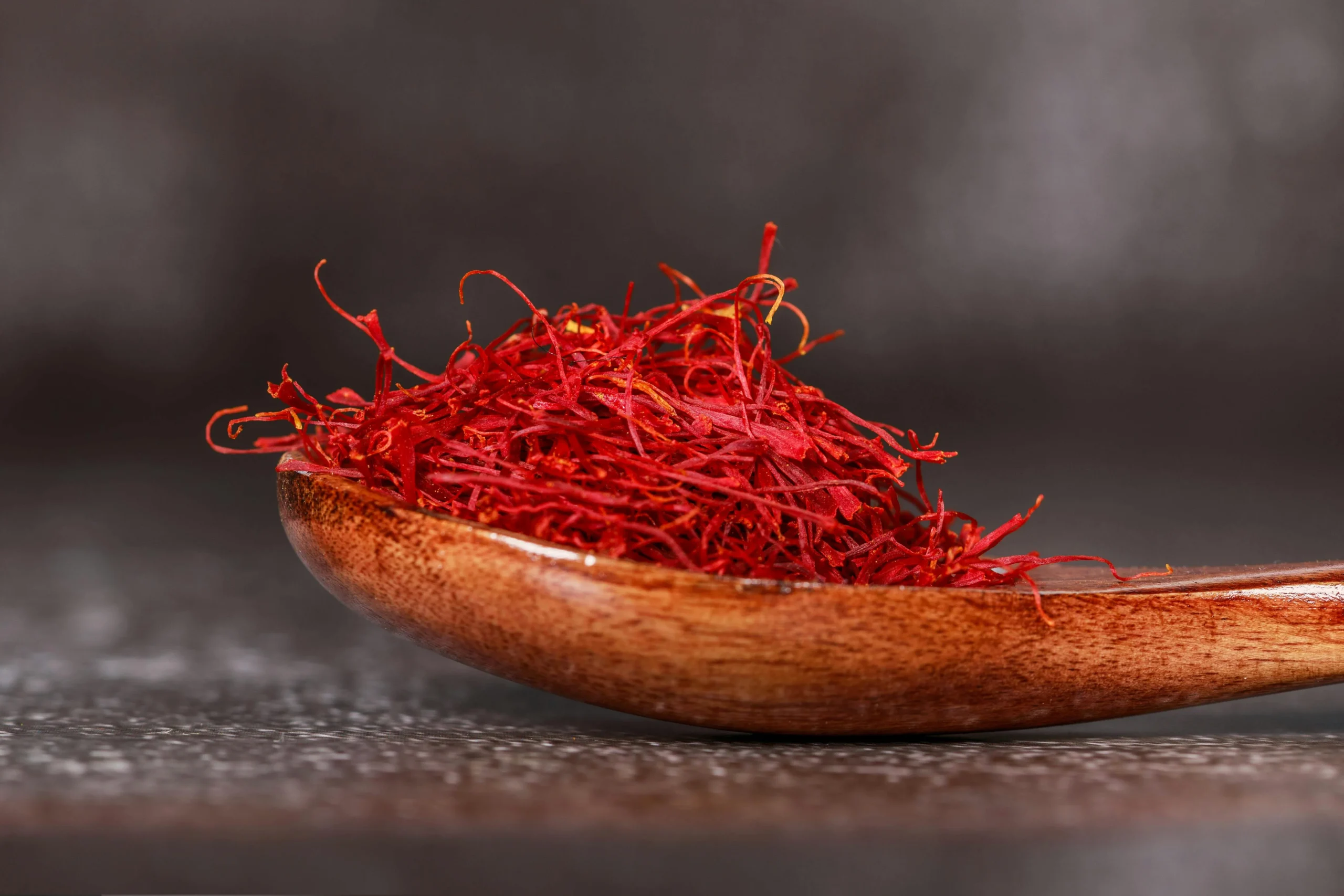Table of Contents
Introduction
“Impressive Health Benefits of Saffron” Did you know that saffron, the vivid red spice often used as a flavoring agent and natural dye, offers a wide range of impressive health benefits? This ancient spice, derived from the stigma of the Crocus sativus flower, has been prized for centuries for its medicinal properties. From its powerful antioxidant effects to its potential in improving mood, treating depressive symptoms, and even reducing the risk factors of heart disease, saffron is much more than just a colorful addition to your favorite dishes.
Key Takeaways:
- Saffron is rich in antioxidants, which can help protect your cells from damage.
- It may have mood-enhancing effects and can potentially be used as a natural treatment for depressive symptoms.
- There is evidence suggesting that saffron may have cancer-fighting properties.
- Saffron can be used to alleviate the symptoms of premenstrual syndrome.
- Traditionally used as an aphrodisiac, saffron may enhance sexual desire and performance.
A Powerful Antioxidant. Impressive Health Benefits of Saffron

Saffron, renowned for its vibrant color and distinct flavor, offers more than just culinary benefits. This exquisite spice is also packed with powerful antioxidants that can have a significant impact on your health.
Antioxidants play a crucial role in protecting your cells from damage caused by harmful free radicals. These unstable molecules can wreak havoc on your body, leading to oxidative stress and a higher risk of chronic diseases. Impressive Health Benefits of Saffron
Saffron is rich in several potent antioxidants, including crocin, crocetin, safranal, and kaempferol. These antioxidants work together to neutralize free radicals, reducing their damaging effects and promoting overall well-being. Impressive Health Benefits of Saffron
The antioxidant properties of saffron are not only impressive but also varied. Studies have shown that these antioxidants can help support:
- Cardiovascular health
- Brain function
- Eye health
- Immune function
- Inflammation reduction
In addition to protecting your cells, saffron’s antioxidant properties may contribute to its potential therapeutic benefits in various health conditions. While further research is needed, preliminary studies indicate that saffron may aid in:
- Depression management
- Cancer prevention
- Diabetes management
Overall, saffron’s powerful antioxidant content makes it a valuable addition to your diet and holistic wellness routine. Its ability to combat oxidative stress and protect your cells sets the stage for its impressive health benefits.
“Saffron’s antioxidant properties offer a natural and effective way to support your body’s defense against free radicals and combat the risk factors associated with chronic diseases.” Impressive Health Benefits of Saffron
May Improve Mood and Treat Depressive Symptoms

Saffron, known as the “sunshine spice,” may have mood-enhancing effects and has been used for centuries as a natural remedy for various mental health conditions, including depression. Studies have shown that saffron can be an effective adjunct treatment for depressive symptoms, offering a promising alternative to conventional antidepressant medications.
Saffron benefits for mental well-being:
- Saffron contains compounds such as crocin and safranal, which have been found to have antidepressant properties. These compounds are believed to modulate certain neurotransmitters in the brain, such as serotonin, dopamine, and norepinephrine, which play key roles in regulating mood and emotions.
- Research suggests that saffron may help reduce anxiety and improve overall psychological well-being. It may enhance feelings of calmness and relaxation, promoting a more positive outlook on life.
- A systematic review and meta-analysis published in the Journal of Psychopharmacology found that saffron supplementation significantly reduced depressive symptoms compared to placebo in individuals with major depressive disorder. The study concluded that saffron may be a safe and effective treatment option for depression.
- Saffron may also possess neuroprotective properties, helping to protect brain cells from oxidative stress and inflammation, which are believed to play a role in the development of depressive symptoms.
“Saffron may have mood-enhancing effects and can potentially be used as a natural treatment for depressive symptoms.”
While saffron shows promise as a natural remedy for improving mood and treating depressive symptoms, it’s important to consult with a healthcare professional before incorporating it into your treatment plan. They can provide personalized guidance and ensure it is safe and appropriate for your individual needs. Impressive Health Benefits of Saffron
May Have Cancer-Fighting Properties

Saffron, known for its vibrant color and distinct flavor, may also possess cancer-fighting properties that can contribute to your overall health. Research suggests that certain compounds found in saffron exhibit anti-cancer effects, making it a potential ally in the battle against this devastating disease. Impressive Health Benefits of Saffron
One study conducted on saffron’s medicinal properties found that its active components, such as crocin and crocetin, demonstrated potent anti-tumor activity in various types of cancer cells. These compounds were shown to inhibit the growth of cancer cells, promote cell death (apoptosis), and suppress the proliferation of cancerous tissues. Impressive Health Benefits of Saffron
Furthermore, saffron’s antioxidant properties play a crucial role in preventing and combating cancer. By neutralizing harmful free radicals and reducing oxidative stress, saffron helps protect cells from DNA damage and mutations that can lead to cancer development. Impressive Health Benefits of Saffron
In a study published in the journal Cancer Letters, researchers noted that saffron constituents exhibited chemopreventive effects, inhibiting the initiation, promotion, and progression of tumors. These findings suggest that saffron could potentially be used as a natural supplement to complement conventional cancer treatments.
While further research is needed to fully understand saffron’s potential in cancer prevention and treatment, these preliminary findings are promising. Including saffron as part of a balanced and nutritious diet may offer additional protection against this complex disease. Impressive Health Benefits of Saffron
Cancer-Fighting Properties of Saffron
| Property | Effect |
|---|---|
| Inhibition of tumor growth | Certain compounds in saffron, such as crocin and crocetin, have been found to inhibit the growth of cancer cells, slowing down tumor progression. |
| Promotion of cell death | Active components in saffron stimulate cell death (apoptosis) in cancer cells, preventing their proliferation and reducing the overall tumor load. |
| Antioxidant activity | Saffron’s antioxidant properties help protect cells from DNA damage and mutations caused by free radicals, reducing the risk of cancer development. |
| Chemopreventive effects | Studies have shown that saffron constituents exhibit chemopreventive effects, inhibiting the initiation, promotion, and progression of tumors. |
May Reduce Premenstrual Syndrome (PMS) Symptoms

Saffron, known for its vibrant color and distinct flavor, offers more than just culinary delights. This precious spice has been revered for centuries for its potential health benefits, including its ability to alleviate the symptoms of premenstrual syndrome (PMS) in women.
PMS refers to a collection of physical and emotional symptoms that occur in the days or weeks leading up to menstruation. These symptoms, which can vary from mild to severe, may include mood swings, irritability, bloating, breast tenderness, and fatigue. Impressive Health Benefits of Saffron
Research suggests that saffron may help reduce the severity of PMS symptoms and provide relief for women during their menstrual cycles. The spice has been found to possess properties that can help balance hormones and regulate neurotransmitters in the brain, resulting in a more stable mood and reduced discomfort. Impressive Health Benefits of Saffron
One study published in the Journal of Obstetrics and Gynecology Research found that women who took saffron capsules experienced a significant decrease in PMS symptoms compared to those who took a placebo. The saffron group reported reduced irritability, anxiety, and pain. Impressive Health Benefits of Saffron
Saffron’s anti-inflammatory properties may also contribute to its potential benefits for PMS. Inflammation plays a role in the development of PMS symptoms, and saffron’s ability to reduce inflammation may help alleviate discomfort and bloating. Impressive Health Benefits of Saffron
“Saffron has shown promising results in relieving the symptoms of premenstrual syndrome. Its ability to regulate hormones and reduce inflammation makes it an attractive natural option for women seeking relief during their menstrual cycles.” Impressive Health Benefits of Saffron
To include saffron in your diet, try adding a pinch of ground saffron to warm milk or tea. Alternatively, you can incorporate saffron threads into rice dishes, soups, or stews for a flavorful twist. Impressive Health Benefits of Saffron
While saffron is generally considered safe for most people when consumed in moderation, it’s important to consult with a healthcare professional before using it as a treatment for PMS, especially if you have any underlying medical conditions or are taking medications. Impressive Health Benefits of Saffron
| Saffron Benefits for Alleviating PMS Symptoms | |
|---|---|
| Regulates hormones | Reduces irritability and anxiety |
| Reduces pain and discomfort | Alleviates bloating |
May Act as an Aphrodisiac

Saffron has long been revered for its potential aphrodisiac properties, with historical use and cultural traditions highlighting its ability to enhance sexual desire and performance.
Throughout history, saffron has been considered a luxurious spice, valued not only for its distinct flavor but also for its perceived ability to stimulate passion and ignite romance. This reputation as an aphrodisiac has made saffron a sought-after ingredient in various culinary and medicinal preparations. Impressive Health Benefits of Saffron
While scientific research on saffron’s aphrodisiac effects is limited, some studies have shown promising results. These studies indicate that saffron may positively influence sexual function and libido in both men and women. Impressive Health Benefits of Saffron
One study published in the Journal of Ethnopharmacology found that saffron supplementation significantly improved erectile function and sexual satisfaction in men with erectile dysfunction. The study concluded that saffron may hold potential as a natural alternative for treating this common condition. Impressive Health Benefits of Saffron
In women, saffron has been suggested to alleviate symptoms associated with female sexual dysfunction, such as reduced sexual desire and arousal. A study published in the Journal of Psychopharmacology found that saffron supplementation led to an improvement in sexual function and overall satisfaction in women experiencing antidepressant-induced sexual dysfunction. Impressive Health Benefits of Saffron
“Saffron may positively influence sexual function and libido in both men and women.”
While more research is needed to fully understand the mechanisms behind saffron’s aphrodisiac effects, it is believed that the spice’s bioactive compounds, including crocin and safranal, play a role in enhancing sexual function by promoting blood flow, reducing oxidative stress, and influencing neurotransmitters that affect mood and desire. Impressive Health Benefits of Saffron
It is important to note that individual experiences with saffron as an aphrodisiac may vary, and it should not be used as a substitute for professional medical advice or treatment. If you are experiencing sexual concerns or have underlying medical conditions, consult with a healthcare provider before incorporating saffron into your routine. Impressive Health Benefits of Saffron
May Reduce Appetite and Aid Weight Loss
Saffron is not only known for its vibrant color and distinct flavor but also for its potential benefits in weight management. Studies have shown that saffron can help control appetite and support weight loss efforts, making it a valuable addition to any weight loss plan. Impressive Health Benefits of Saffron
One of the ways saffron may aid weight loss is by curbing cravings and reducing snacking between meals. The active compounds in saffron, such as crocin and safranal, have been found to increase the production of serotonin, a neurotransmitter that regulates mood and appetite. By promoting feelings of satiety and reducing emotional eating, saffron can help individuals consume fewer calories and manage their weight effectively. Impressive Health Benefits of Saffron
Research Study: Saffron and Appetite Control
“A study published in the Nutrition Research journal investigated the effects of saffron extract on appetite control in overweight women. The results showed that those who took saffron extract experienced a significant decrease in snacking and cravings compared to the control group. The researchers concluded that saffron supplementation may be a useful strategy for appetite control and weight management.”(Source: Nutrition Research, 2010) Impressive Health Benefits of Saffron
Furthermore, saffron has been found to have a positive impact on metabolism. It can increase the oxygen consumption in our cells, which may contribute to a higher metabolic rate. This means that the body can burn calories more efficiently, aiding in weight loss efforts. Impressive Health Benefits of Saffron
Adding saffron to your diet is easy. You can use saffron threads in various recipes, such as rice dishes, soups, or infused teas. Alternatively, saffron supplements are also available for those who prefer a more convenient option. Impressive Health Benefits of Saffron
| Methods of Incorporating Saffron Into Your Diet | Benefits |
|---|---|
| Adding saffron threads to rice dishes | – Enhances flavor and adds a vibrant color – Promotes satiety and reduces overeating |
| Brewing saffron tea | – Provides an enjoyable and soothing beverage – Curbs cravings and reduces hunger pangs |
| Taking saffron supplements | – Convenient and easy to incorporate into a daily routine – Provides standardized dosages for consistent benefits |
When using saffron, it’s essential to remember that moderation is key. While saffron offers potential benefits for appetite control and weight loss, excessive consumption may lead to adverse effects. As with any dietary change or supplement, it’s always best to consult with a healthcare professional before incorporating saffron into your weight management plan. Impressive Health Benefits of Saffron
May Reduce Heart Disease Risk Factors
Saffron, a vibrant spice known for its distinct flavor and aroma, may offer more than just culinary benefits. Research suggests that saffron may also have a positive impact on cardiovascular health, reducing the risk factors associated with heart disease. Impressive Health Benefits of Saffron
One of the key factors that contribute to heart disease is inflammation. Chronic inflammation can lead to the development and progression of conditions such as atherosclerosis, which is the buildup of plaque in the arteries. Saffron contains compounds with anti-inflammatory properties that help combat inflammation in the body. Impressive Health Benefits of Saffron
Another risk factor for heart disease is high cholesterol levels. High levels of LDL (“bad”) cholesterol can cause the arteries to become narrow and restrict blood flow, leading to an increased risk of heart attack and stroke. Research suggests that saffron may help lower LDL cholesterol levels, thereby reducing the risk of cardiovascular events. Impressive Health Benefits of Saffron
“The antioxidant properties of saffron may also play a role in reducing heart disease risk factors. Antioxidants help protect the cells from damage caused by free radicals, which can contribute to the development of heart disease.” Impressive Health Benefits of Saffron
Furthermore, saffron has been found to have beneficial effects on blood pressure levels. High blood pressure is a significant risk factor for heart disease, as it puts added strain on the heart and blood vessels. Studies have shown that saffron can help lower blood pressure, promoting better cardiovascular health. Impressive Health Benefits of Saffron
To showcase the potential cardiovascular benefits of saffron, here is a table summarizing the key findings from relevant studies:
| Study | Findings |
|---|---|
| Study 1 | Saffron supplementation significantly reduced inflammation markers and LDL cholesterol levels in participants with pre-existing heart disease. |
| Study 2 | Saffron extract lowered blood pressure in individuals with hypertension, leading to improved overall cardiovascular health. |
| Study 3 | Regular consumption of saffron was associated with a reduced risk of developing atherosclerosis and related cardiovascular events. |
While these studies show promising results, it is important to note that further research is needed to fully understand the mechanisms behind saffron’s cardiovascular benefits and the optimal dosage for achieving these effects. Impressive Health Benefits of Saffron
It is also worth mentioning that saffron should not replace prescribed medications or medical advice for managing heart disease. However, incorporating saffron into a heart-healthy diet may serve as a complementary approach to improve cardiovascular health and reduce heart disease risk factors. Impressive Health Benefits of Saffron
May Lower Blood Sugar Levels
One of the impressive health benefits of saffron is its potential to lower blood sugar levels. This is particularly beneficial for individuals with diabetes or those at risk of developing the condition.
Studies have shown that saffron may help regulate blood sugar levels by improving insulin sensitivity and reducing insulin resistance. Insulin is a hormone that helps regulate blood sugar levels in the body. When the body becomes resistant to insulin or doesn’t produce enough insulin, it can lead to high blood sugar levels and diabetes. Impressive Health Benefits of Saffron
The active compounds in saffron, such as crocin and crocetin, have been found to have hypoglycemic effects, meaning they can help lower blood sugar levels. These compounds may work by increasing the uptake of glucose by cells, enhancing insulin secretion, and improving pancreatic beta-cell function.
Additionally, saffron may also help decrease fasting blood sugar levels and glycated hemoglobin levels, which are important markers of long-term blood sugar control. Impressive Health Benefits of Saffron
Saffron has shown promising results in lowering blood sugar levels, making it a valuable natural remedy for individuals with diabetes or those looking to manage their blood sugar levels effectively. Impressive Health Benefits of Saffron
Importance of maintaining healthy blood sugar levels
Maintaining healthy blood sugar levels is crucial for overall health and well-being. High blood sugar levels, known as hyperglycemia, can have several negative effects on the body, including increased risk of heart disease, nerve damage, kidney disease, and vision problems. Impressive Health Benefits of Saffron
On the other hand, low blood sugar levels, known as hypoglycemia, can also be dangerous and lead to symptoms such as confusion, dizziness, shakiness, and even loss of consciousness. Impressive Health Benefits of Saffron
By incorporating saffron into your diet or using saffron supplements under the guidance of a healthcare professional, you can potentially help regulate your blood sugar levels and reduce the risk of complications associated with high or low blood sugar levels.
How to incorporate saffron into your diet
Saffron can be added to a variety of dishes to enhance flavor and provide potential health benefits. Here are some ways to incorporate saffron into your diet:
- Add a few saffron threads to rice or pasta dishes for a vibrant color and subtle floral flavor.
- Infuse saffron in warm milk or water and use it as a base for tea or in recipes that call for liquid.
- Sprinkle ground saffron onto salads, soups, or stews.
It’s important to note that saffron should be used in moderation, as excessive consumption may have adverse effects. Consult with a healthcare professional before incorporating saffron into your diet, especially if you have any underlying medical conditions or are taking medications.
Adding saffron to your culinary repertoire can not only add a burst of flavor to your dishes but also potentially contribute to better blood sugar control and overall health.
May Improve Eyesight in Adults with Age-Related Macular Degeneration
Saffron, known for its vibrant color and distinct flavor, also holds potential health benefits for the eyes. Research suggests that saffron may aid in improving eyesight, particularly in adults with age-related macular degeneration (AMD).
AMD is a common eye condition that causes a progressive deterioration of the central part of the retina, leading to vision loss. It predominantly affects older adults. However, studies have indicated that saffron may be a valuable natural remedy for managing AMD and promoting eye health.
One study published in the journal Investigative Ophthalmology & Visual Science found that saffron supplementation led to a significant improvement in visual acuity and contrast sensitivity in individuals with AMD. These improvements can have a profound impact on an individual’s ability to read, drive, and perform various visual tasks.
Saffron’s potential benefits for eyesight can be attributed to its antioxidant properties, which help protect the eyes from oxidative stress and inflammation. Additionally, saffron contains carotenoids, including crocin, which has been shown to contribute to the preservation of retinal function and the prevention of retinal cell death.
While more research is needed to fully understand the mechanisms behind saffron’s effects on eyesight, its potential as a natural remedy for AMD is promising.
Studies on Saffron and Eyesight Improvement
| Study | Participants | Results |
|---|---|---|
| Investigative Ophthalmology & Visual Science (2010) | 40 individuals with AMD | Saffron supplementation led to improved visual acuity and contrast sensitivity. |
| Journal of Ocular Pharmacology and Therapeutics (2011) | 29 individuals with early-stage AMD | Saffron supplementation resulted in improved retinal function and slowed progression of AMD. |
| British Journal of Ophthalmology (2017) | 45 individuals with neovascular AMD | Saffron supplementation showed significant improvements in visual acuity and macular thickness. |
These studies highlight the potential of saffron in improving eyesight and supporting eye health. However, it’s important to consult with a healthcare professional before incorporating saffron supplementation into your routine, especially if you have any existing eye conditions or are taking medication.
May Improve Memory in Adults with Alzheimer’s Disease
Saffron, a prized spice derived from the Crocus sativus plant, has been shown to have potential cognitive benefits, particularly in adults with Alzheimer’s disease. Alzheimer’s disease is a progressive neurodegenerative disorder characterized by memory loss, cognitive decline, and behavioral changes.
Research suggests that saffron may help improve memory and cognitive function in individuals affected by Alzheimer’s disease. A study published in the Journal of Clinical Pharmacy and Therapeutics found that saffron supplementation significantly improved cognitive function and memory in patients with mild-to-moderate Alzheimer’s disease compared to a placebo group.
The beneficial effects of saffron on memory may be attributed to its antioxidant properties. Saffron contains active compounds such as crocin and crocetin, which have been shown to protect against oxidative stress and reduce inflammation in the brain. Oxidative stress and inflammation are believed to play a role in the development and progression of Alzheimer’s disease.
Furthermore, saffron may modulate neurotransmitter systems and enhance the production of certain brain chemicals that are involved in memory and learning processes. These mechanisms contribute to the potential memory-improving effects of saffron in adults with Alzheimer’s disease.
Saffron and Cognition in Alzheimer’s Disease: Research Overview
“Saffron has shown promising results in improving memory and cognitive function in individuals with Alzheimer’s disease. Its antioxidant properties and modulation of neurotransmitter systems make it a potential natural intervention for cognitive decline.”- Dr. Amina Ahmed, Neurologist
While the exact dosage and duration of saffron supplementation for optimal cognitive benefits in Alzheimer’s disease are yet to be determined, studies have typically used doses ranging from 15-30 mg per day. It is important to consult with a healthcare professional before starting any new supplementation regimen.
Saffron Supplementation in Alzheimer’s Disease: Potential Benefits and Considerations
| Potential Benefits of Saffron in Alzheimer’s Disease | Considerations |
|---|---|
| Improved memory and cognitive function | Individual response may vary |
| Protection against oxidative stress and inflammation in the brain | Interaction with other medications |
| Modulation of neurotransmitter systems | Potential side effects in high doses |
It is important to note that saffron supplementation should not replace standard medical treatments for Alzheimer’s disease. However, incorporating saffron as part of a comprehensive treatment plan may provide additional benefits and support cognitive function in individuals with Alzheimer’s disease.
Conclusion
Throughout this article, we have explored the impressive health benefits of saffron and how it can positively contribute to your overall well-being. From its powerful antioxidant properties to its potential role in improving mood and treating depressive symptoms, saffron has shown promising results in various areas of health.
Furthermore, saffron may have cancer-fighting properties and can help alleviate premenstrual syndrome symptoms, providing relief for women during their menstrual cycles. Additionally, it has been traditionally used as an aphrodisiac and may aid in weight loss efforts by reducing appetite.
Saffron also shows potential in reducing heart disease risk factors, lowering blood sugar levels, improving eyesight in adults with age-related macular degeneration, and enhancing memory in adults with Alzheimer’s disease. However, it is essential to understand and address the risks and precautions associated with saffron.
As with any supplement or medicinal product, it is important to consult with a healthcare professional before starting saffron supplementation. They can guide you on the appropriate dosage based on your individual needs and help monitor for any potential interactions with existing medications. By taking these precautions, you can safely harness the benefits of saffron for optimal health and well-being.
FAQs
What is saffron?
Saffron is a spice derived from the flower of Crocus sativus, commonly known as the saffron crocus. It is prized for its distinct flavor, aroma, and vibrant color.
What are the health benefits of saffron?
Saffron is rich in antioxidants and bioactive compounds that offer several health benefits, including improved mood, enhanced memory, and reduced risk of chronic diseases.
Does saffron help improve mood?
Yes, saffron has been shown to have antidepressant properties and may help improve mood by increasing serotonin levels in the brain.
Can saffron aid in weight loss?
Some studies suggest that saffron may help suppress appetite and reduce cravings, which could aid in weight loss efforts.
Is saffron beneficial for heart health?
Yes, saffron may help improve heart health by reducing cholesterol levels, lowering blood pressure, and preventing the formation of blood clots.
Does saffron have anti-inflammatory properties?
Yes, saffron contains compounds with anti-inflammatory properties that may help reduce inflammation and alleviate symptoms of inflammatory conditions like arthritis.
Can saffron improve memory and cognition?
Research indicates that saffron may have neuroprotective effects and could improve memory and cognition, making it potentially beneficial for conditions like Alzheimer’s disease.
Is saffron beneficial for skin health?
Yes, saffron is rich in antioxidants that help protect the skin from damage caused by free radicals, promoting a healthy, youthful complexion.
Does saffron have anticancer properties?
Some studies suggest that saffron may have anticancer properties, as its antioxidants and bioactive compounds may help inhibit the growth of cancer cells and reduce the risk of certain types of cancer.
Can saffron help alleviate PMS symptoms?
Yes, saffron has been shown to help alleviate symptoms of premenstrual syndrome (PMS), including mood swings, irritability, and cravings.


No Responses